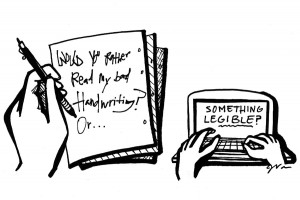Laptops deserve a chance
I don’t even know how many times in my academic career a teacher has complained to me about how incredibly horrible my handwriting was on in-class writing assignments.
For more than 20 years I have had to put up with professors telling me things like “Your essay was completely illegible” or “You need to practice your handwriting.”
One time I even read this on an essay: “Didn’t even bother with this one.”
I’m tired of having my professors disregard the content of my essays and instead focus on the way in which I translate my thoughts onto paper, and I’m sure I’m not alone.
It is time that USC takes a proactive role in solving this problem.
If students are allowed to use a word processing program when writing in-class essays, both students and professors would benefit.
I can already see the USC administration reacting to this suggestion with some skepticism.
Laptops are cheating machines, right?
If students are able to use their laptops on a test, what is to stop them from going on the internet to look up key points for their essay?
What prevents a student from having a cheat sheet already typed up on a word document.
Even better, what prevents the student from having the essay already written beforehand?
The answer lies in computer surveillance.
At my high school, every school-owned computer had a video surveillance program installed on it.
The program allowed the teacher to view the activities of the class by simply logging onto the “main computer,” which was usually the teacher’s personal laptop.
If USC purchases a surveillance program such as “SpectorSoft,” the program my high school uses, professors would be able to administer in-class writing assignments via computer without worrying about cheating.
Let’s face it, handwriting is dead.
With each advancing day, the written form is becoming more and more irrelevant in the computer-based society we live in.
In an article in the Washington Post, Margaret Webb Pressler reports cursive is slowly being eradicated from elementary school curriculums.
What is taking its place? Typing. USC can be the first school to take this idea one step further.
If students were able to type their in-class essays, the quality of the work would increase because it would be easier to edit and organize.
And according to today’s youth, we can even type a lot faster than they can write.
This tactic would also allow students to interact more with their professors and take advantage of new opportunities.
Once a student finishes writing an essay, the student’s written work can be easily sent to the professor.
This process gives students the ability to interact directly with their professor.
Then, once each essay has been graded, the professor can send their personal comments to each student.
More importantly, this new test-taking plan can help out the Earth.
USC can do its part to help Mother Earth get back on her feet.
By converting its current test administering strategy, — trash-pile-friendly blue books — into this new, strictly computer-based testing policy, our university would be moving in the right direction.
If in-class essay writing became 100 percent digital, there would be no reason to ever purchase a tree-wasting blue book ever again.
It is going to take more than one article to change the way USC administers its tests, but a looming question remains.
Why are students allowed to use their computers to write out- of-class essays, but are restricted from using them to complete in-class assignments?
If this policy can be reformed to meet the current needs of students, then we will surely be better off moving forward.
As a leading private research university, we need to employ the cutting edge technology — fit for our times — in the classroom.
Let’s catch up with the times, and make computers available in class just as much as they are outside of it.
After all, shouldn’t we be allowed the same luxuries in class as we are out of the classroom?
David Morris is a sophomore majoring in English (creative writing.)


nevermind, are you suggesting everyone install the software on their laptop? there’s a way to make sure every student installed the software?
having a computer for every student in every classroom is not practical. very expensive expenditure. besides, even though you’re saving trees, you’re creating a lot of e-waste and using up electricity.
suck it up and write better. what are you, 3?
Good idea. I’ve always thought the same.
This is coming from an English major?!? So you just openly admitted that you’re good at absolutely nothing…*applause*